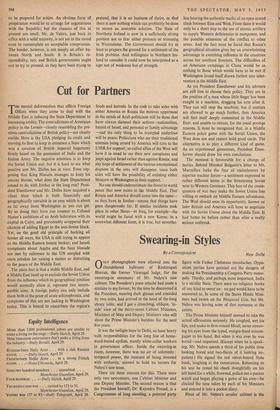Cut for Partners
Tun mental deforestation that afflicts Foreign Offices when they come to deal with the Middle East is reducing the State Department to increasing aridity. The contradictions of American policy in the Levant—closely resembling the pre- vious contradictions of British policy—are clearly visible. Here is the USA pledging its credit and moving its fleet to keep in existence a State which was a creation of British imperial hegemony firmly based on the possession of India and the Indian Army. The negative intention is to keep the Soviet Union out; but it is hard to see what positive aim Mr. Dulles has in view. Even sup- posing that King Hussein manages to keep his uneasy throne, what does the State Department intend to do with Jordan in the long run? Presi- dent Eisenhower and Mr. Dulles have acquired a client State which is both financially and geographically unviable in an area which is about as far away from Washington as you can get. By so doing they have run counter to Colonel Nasser's ambitions of an Arab federation with its capital in Cairo, and presumably scuppered their chances of adding Egypt to the anti-Soviet block. Yet, on the good old principle of backing all horses all ways, the USA is still trying to appear as the Middle Eastern honest broker; and Israeli complaints about Aqaba and the Suez blocade are met by reference to the UN coupled with stern rebukes for raising a matter so disturbing to the peace of the Middle East.
The plain fact is that a stable Middle East, and a Middle East lined up to exclude the Soviet Union from the influence which its geographical position would normally allow it, represent two incom- patible aims. A foreign policy can only include them both at the price of acute schizophrenia, and symptoms of this are not lacking in Washington today. This is bound to exacerbate the region's feuds and hatreds. In the rush to take sides with either America or Russia the motives uppermost in the minds of Arab politicians will be those that have always dictated their actions—nationalism, hatred of Israel, and personal or family advantage —and the only thing to be ,trampled underfoot will be peace. Politicians who see their traditional enemies being armed by America will turn to the USSR for support; so-called allies of the West will have it in mind to use their new aeroplanes and jeeps against Israel rather than against Russia; and any hope of settlement of the various international disputes in the area will disappear, since both sides will have the possibility of enlisting either Moscow or Washington in their support.
. No one should underestimate the threat to world peace that now exists in the Middle East. That Russia and America should come into the open— as they. have in Jordan—means that things have gone dangerously far. If similar incidents took place in other States—in Iraq, for example—the world might be faced with a new Korea; in a somewhat different form, it is true, but neverthe- less bearing the authentic marks of an open armed clash between East and West. From there it would only be a short step to the use of atomic artillery to supply Western deficiencies in manpower, and the possible extension of the conflict to other areas. And the fact must be faced that Russia's geographical situation gives her an overwhelming advantage in exercising influence in the countries across her southern frontiers. The difficulties of an American campaign in China would be as nothing to those which would have to be met if Washington found itself drawn further into inter- vention in the Middle East.
As yet President Eisenhower and his advisers are still free to choose their policy. They are in the position of a. man whose little finger has been caught in a machine, dragging his arm after it. They can still stop the machine; but if matters are allowed to go much further, then America will find itself deeply committed in the Middle East; and unable to retreat, for the usual prestige reasons. It must be recognised that, in a Middle Eastern poker game with the Soviet Union, the West does not and cannot hold good cards. The alternative is to play a different kind of game. As an experienced gamesman, President Eisen- hower should draw his own conclusions.
The moment is favourable for a change of tactics. Behind Marshal Bulganin's letter to Mr. Macmillan lurks the fear of encirclement by superior nuclear forces—a sentiment expressed in rather different terms in the threatening Soviet note to Western Germany. This fear of the conse- quences of war may make the Soviet Union less willing to embark on Middle Eastern adventures. The West should seize its opportunity. Sooner or later Britain and America will have to negotiate with the Soviet Union about the Middle East. It had better be before rather than after a really serious outbreak.










































 Previous page
Previous page